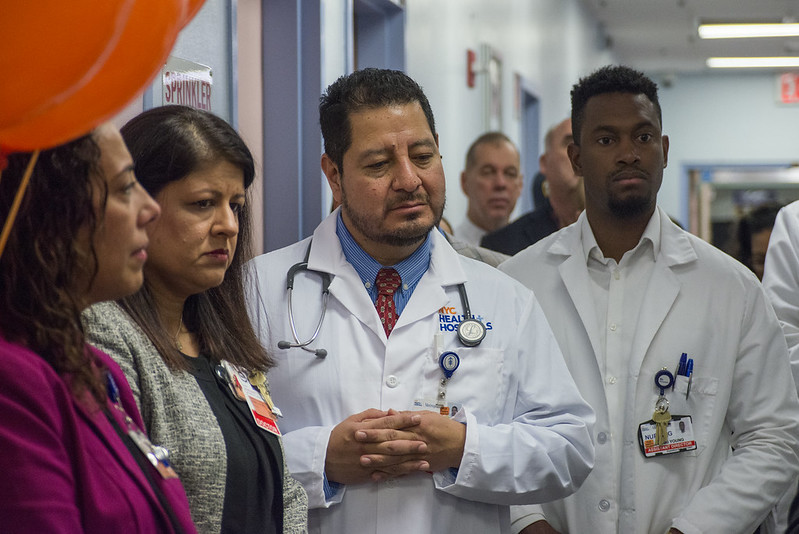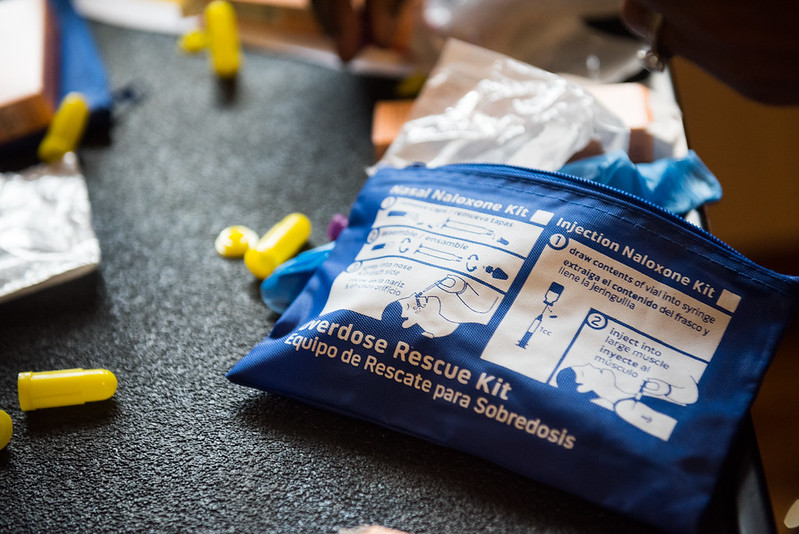Courts and Other Officials Must Act Now to Protect Right to Counsel in Eviction Proceedings

Protect housing for the most vulnerable (photo: Michael Appleton/Mayoral Photography Office)
Five years ago, New York became the first city in the country to create a right to counsel for low-income tenants facing eviction. Unfortunately, this right is now being hollowed out by the combination of a recent explosion of eviction cases and a shortage of tenants’ rights attorneys. Since the beginning of March, housing court judges have compelled at least 18 tenants to participate in their own eviction proceedings without access to a city-funded attorney.
This should not be happening. Our courts have the power to proactively manage their dockets to protect the right to counsel. It is time for them to use it.
Like so many challenges these days, the current threat to the right to counsel has its roots in the pandemic. The stresses of covid, combined with low pay and long hours, have led to a great resignation of young tenant rights attorneys. Our city-funded right to counsel programs have been depleted as a result. The Bronx Right to Counsel program, for example, recently reported that it has lost over a quarter of its tenant rights attorneys.
Tenants might not have initially noticed this shortage of attorneys because a statewide moratorium on eviction proceedings remained in place. That moratorium recently expired. Now eviction filings are skyrocketing.
The long-run solution to this challenge is to replenish the number of tenants’ rights attorneys and to reduce evictions by passing “good cause” eviction legislation. In the short-run, however, our options for protecting tenants are limited. Today, even though city law promises that every tenant earning less than 200% of the federal poverty level has the right to an attorney in eviction proceedings, in practice many cannot get one.
Tenant attorneys are currently overwhelmed, with many reportedly handling 80 cases at a time. Legal service providers are concerned that if attorneys take on even more clients they will not be able to provide quality counsel, putting them at risk of violating their ethical obligations to provide tenants with competent representation.
Our courts must act to protect the right to counsel. In cases where a tenant is entitled to a city-funded attorney but cannot find one, state law empowers housing court judges to adjourn eviction proceedings until an attorney becomes available. New York’s Office of Court Administration could direct housing court judges to use that power to slow the torrent of eviction proceedings to match the availability of tenant attorneys.
Unfortunately, the Office of Court Administration announced that it would not do so. Instead, eviction cases are proceeding double time. Whereas in some courts judges used to hear one eviction proceeding every 30 minutes, they are now reportedly hearing two cases every 15 minutes.
These assembly-line style eviction proceedings are devastating for families. Without counsel present, landlords – who are almost always represented by an attorney – are able to ride roughshod over tenants, who are overwhelmingly low-income Black and Latino New Yorkers.
This only causes unnecessary pain on all sides. Attorneys can often prevent evictions and help landlords get paid. They are able to help tenants access federal funds to cover overdue rent or find other paths to stay in their homes. In fact, according to legal service providers, right to counsel legislation can reduce evictions by more than half. The original Right to Counsel bill, which passed in 2017, was an unconditional success: 84% of families facing eviction stayed in their homes in the program’s first year.
If our courts will not act on their own, we need all hands on deck to solve this crisis. The city’s Office of Civil Justice, which is responsible for working with legal service providers to ensure a right to counsel, should step into the breach. The state Office of Court Administration has signaled that it might be willing to adjust its docketing practices if the city Office of Civil Justice asks it to do so. The Office of Civil Justice should engage the courts immediately to find a speedy resolution.
In addition, the New York City Council, where we are members, must act to prevent our history-making right to counsel legislation from becoming dead letter. If state legislation is needed to reform the Office of Court Administration in order to better safeguard our tenants, the City Council should work with lawmakers in Albany to get this done. Regardless, the Office of Court Administration should set an upper limit on the number of housing cases that one judge puts on their calendar at a time.
Every day, families walk into a court of law, alone, unaided by an expert of the law. Tragically, entering without an attorney often means exiting without a home. Instead of rushing people out of stable housing, the courts must give every New Yorker a true right to counsel by adjourning until an attorney can be provided.
***
City Council Member Shaun Abreu represents parts of Upper Manhattan and chairs the Council’s Committee on State and Federal Legislation, and is a former tenant rights attorney who was evicted from his home as a child. Deputy City Council Speaker Diana Ayala represents neighborhoods in Upper Manhattan and the South Bronx with some of the highest eviction rates in the city and chairs the Council’s Committee on General Welfare. On Twitter @ShaunAbreu & @DianaAyalaNYC.
***
Have an op-ed idea or submission for Gotham Gazette? Email This email address is being protected from spambots. You need JavaScript enabled to view it.
A Critical Opportunity for New York to Increase Care Not Coercion for Those Living with Serious Mental Illness

Health care at the hospital (photo: Jeff Reed/City Council)
Far too many New Yorkers living with serious mental illnesses have been left to languish in our streets, hospitals, jails, and prisons without adequate access to the health care, housing, employment, and other rehabilitative and supportive services they need to survive and thrive.
Thankfully, help is on the way this year. In the next week, the Governor and State Legislature will work to pass a budget launching an unprecedented number of initiatives to help New Yorkers to get ahead of and better manage serious mental health crises and, in doing so, will both advance public health and public safety for all New Yorkers.
With these budget investments, New York will be in a position to help people before a crisis by providing over 1,000 new housing units to help unhoused New Yorkers secure a safe place to stay. We’ll also be able to put 20 new Safe Options Support Teams of trained mental health practitioners out in the community to bring hope and help to those who are at risk of relapse, hospitalization, and incarceration.
This July, we’ll be launching a new 9-8-8 mental health and suicide prevention lifeline system in New York that will offer immediate access to a trained crisis counselor, with follow-up available at newly-developed crisis stabilization and respite centers as needed.
The proposed budget investments would also put upwards of 1,000 psychiatric inpatient beds online across the state that will allow for longer hospital admissions for those in acute psychiatric need.
And we will be providing desperately needed help to our hard-pressed community mental health workforce with the largest cost of living adjustment in recent history.
But what we must not do is to return to the onerous policies of the past and force more people with mental illness to be placed on coercive treatment orders.
The truth is that people who live with severe mental illnesses are eleven times more likely to be victims of violence and five times more likely to be murder victims. By providing care that addresses their most urgent needs, we are keeping them and our entire communities safe.
Kendra’s Law – establishing a system of “Assisted Outpatient Treatment” that is a court-ordered and mandatory detainment of individuals suffering from mental illness – has resulted in glaring disparate racial impacts. Since the program’s start in 1999, four out of five outpatient treatment orders have involved Black and Hispanic people in New York City.
Policies that criminalize people in need and that discriminate based on race will only further disincentivize people from seeking out community-based supports that could have made a difference before a crisis ever occurs.
We know how to help people in the greatest need and we are bringing new programs online that will voluntarily engage large numbers of people who have committed no crimes – saving lives and hundreds of thousands of taxpayer dollars.
Rather than to expand Kendra's Law, let’s use this moment to engage, support, and serve thousands of New Yorkers during times of their greatest need, creating or augmenting essential, voluntary crisis services, hospital care and supportive housing.
***
New York State Senator Samra G. Brouk represents parts of Monroe and Ontario counties, including Rush, Mendon, Pittsford, Perinton, Fairport, Penfield, East Rochester, East Irondequoit, Naples, Bloomfield, Victor, and the east side of the City of Rochester and is chair of Senate Committee on Mental Health. Harvey Rosenthal is CEO of New York Association of Psychiatric Rehabilitation Services (NYAPRS). On Twitter @SenatorBrouk & @HarveyRosentha3.
***
Have an op-ed idea or submission for Gotham Gazette? Email This email address is being protected from spambots. You need JavaScript enabled to view it.
Saving Lives from New York City to Rochester and Beyond

Overdose rescue kit (photo: Edwin J. Torres/Mayoral Photo Office)
The city of Rochester is not immune to our country’s overdose crisis. In 2020, the most recent year we have data from, we lost over 230 people to preventable overdoses in our city, and preliminary data points to that only increasing in 2021. Each person we are losing sends a shockwave through our communities and families, and we cannot give in to the idea that this epidemic is normal or unpreventable.
The reality is, every overdose death is preventable. New York is making history and proving there is a solution that will keep our loved ones alive, and that solution is Overdose Prevention Centers (OPCs).
Right now, New York City is leading the charge on curbing these deaths with the launch of two OPCs in areas of the city hit hard by the overdose crisis. In just two months, well over 100 lives have been saved through intervening in overdoses that could have otherwise been fatal.
It’s not hard to imagine the people we could help and lives we could save in Rochester if we also had OPCs. In truth, we don’t have to imagine — there is legislation on the table right now to authorize these sites to open across the state.
The Safer Consumption Services Act (SCSA), sponsored by my colleagues Senator Gustavo Rivera and Assemblymember Linda Rosenthal, is a concrete step we can take to curbing the overdose crisis in New York. It would authorize local organizations that already serve our communities to add this lifesaving service to their existing programming.
If the lives saved at New York City’s two initial sites isn’t evidence enough, OPCs have been successful for over 35 years with over 120 centers around the world. And the best news: not a single person has died of an overdose on their watch.
The benefits of this legislation stretch much farther than ending the overdose crisis we have on our hands. OPCs create spaces where health-care providers can connect and build trust with people who use, and connect them with public health tools to keep them, and the communities they belong to, safe and alive. In addition to saving over a hundred lives, the OPCs in New York City have provided wraparound services to hundreds of community members. Hepatitis C testing, sterile syringe exchange, and mental health counseling—all of which can help get people into long-term substance use treatment if that’s what they want—are also offered to participants at OPCs.
OPCs are also a critical tool in preventing the spread of HIV, where rates of transmission have led to a cluster of HIV cases in Monroe County. In 2020, more than 50 people were diagnosed with HIV–a number that has likely risen–as a direct result of the years of underfunding of harm reduction services before and during the pandemic. It’s my responsibility to the people of Rochester to course-correct and do everything in my power to prevent more harm from being done.
The numbers speak for themselves, but unfortunately, the opposition speaks loudly. Those with a political agenda lean on tired, dangerous, and false narratives that any harm reduction tool will enable drug use. This couldn’t be farther from the truth. Like so many harm reduction strategies already widely used in New York, spaces dedicated to keeping people alive will not encourage more drug use, but will keep all of the community safe, and provide people with the services that they need. OPCs will bring our loved ones out of the shadows and away from public use and into the care of medical professionals.
The state of New York is in the midst of a watershed moment. We can either choose to meet the overdose crisis with proven solutions and compassion, or we can continue with the same failed approaches that criminalize people who use drugs without offering any real help. I refuse to accept that the way things have been done is the only way they can be.
We have the answers in front of us, we have the care providers who are willing to step up, and we have the need in our community. It’s time for overdose prevention centers to become a reality across the state, and with the Safer Consumption Services Act, I hope to see as many lives saved in Rochester as in New York City. It’s time to get it done.
***
Demond Meeks serves as the Assembly member for District 137 and is a native of Rochester. On Twitter @DemondLMeeks.
***
Have an op-ed idea or submission for Gotham Gazette? Email This email address is being protected from spambots. You need JavaScript enabled to view it.




